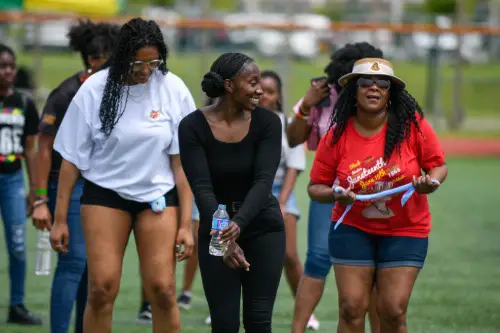The phrase “It takes a village” is more than just a saying; it’s a blueprint for building strong, resilient communities. For the Black community in America, this sentiment holds profound significance. From the Underground Railroad to HBCUs, barbershops to church pews, mentorship and support networks have always been the backbone of collective empowerment. In a world where systemic barriers still persist, these relationships are not just nice to have—they’re essential.
Let’s dive into why mentorship and community support are vital and how they’re shaping brighter futures for Black individuals and families today.
A Hand Up, Not a Handout: The Transformative Power of Mentorship

Imagine being 17, unsure about the future, but knowing you want more out of life. Now imagine someone who looks like you—who’s been where you are—taking the time to guide you. That’s the power of mentorship.
Mentorship has always been a cornerstone of Black progress. From Booker T. Washington mentoring a young George Washington Carver to modern programs like My Brother’s Keeper, the act of passing wisdom from one generation to the next ensures that no one has to navigate life’s complexities alone.
For many, mentorship means survival. A mentor helps you avoid pitfalls, encourages your dreams, and models what success can look like in a world where media stereotypes often paint a different picture. It’s a symbiotic relationship: while mentees gain invaluable guidance, mentors also grow. They’re reminded of their own journeys and get the satisfaction of seeing the next generation rise.
Take stories like that of Ashley, a first-generation college student from Chicago. Her mentor, a Black woman who’d navigated corporate America, helped her land internships, prepare for interviews, and overcome impostor syndrome. Today, Ashley is paying it forward, mentoring high school students in her community.
Mentorship isn’t just a “nice thing to do”—it’s a strategy. A 2019 study by MENTOR: The National Mentoring Partnership found that young people with mentors are 55% more likely to enroll in college and 78% more likely to volunteer in their communities. Those numbers don’t just represent personal wins—they’re ripples that strengthen the entire community.
Community: The Original Safety Net

When times get tough, community shows up. Whether it’s organizing food drives, raising bail funds, or creating safe spaces for conversations about mental health, the Black community has always leaned on its collective strength.
But community isn’t just about responding to crises. It’s about building infrastructure—both tangible and intangible—that uplifts everyone. Historically, organizations like the Black Panther Party provided free breakfast programs and health clinics long before the government stepped in. Today, nonprofits, grassroots organizers, and even local businesses are filling gaps left by failing systems.
Consider the story of Black Girls Code. Founded by Kimberly Bryant, this organization teaches coding and tech skills to young Black girls. It’s not just about learning to code; it’s about cultivating a sense of belonging in industries where they’re underrepresented. Programs like this reinforce the idea that we rise together—and that there’s power in pooling resources, knowledge, and encouragement.
Yet, community support doesn’t always look like formal programs. Sometimes, it’s as simple as neighbors looking out for each other or elders sharing stories at family reunions. This relational glue is what sustains the culture and ensures that knowledge, traditions, and resilience are passed down.
But it’s not all rosy. The pandemic exposed how fragile these systems can be when stretched too thin. That’s why strengthening and investing in our communities is more critical than ever. Building up local organizations, supporting Black-owned businesses, and volunteering your time or expertise can make a world of difference.
Passing the Torch: Creating a Legacy of Empowerment
When we talk about empowerment, it’s not just about helping individuals succeed—it’s about creating legacies. Every successful mentorship relationship and every supportive community initiative plants seeds for the future. And when those seeds grow, they create a garden that nourishes everyone.
Think about historical figures like Ida B. Wells or Malcolm X. Their work wasn’t just for themselves; it was about laying a foundation for others to build upon. Today’s Black leaders, from entrepreneurs to activists, carry that same spirit, ensuring the torch is passed to a new generation.
One modern example is LeBron James’ I PROMISE School. It’s more than just a school; it’s a testament to what happens when mentorship and community come together. By providing students and their families with resources—like housing assistance, job placement programs, and even a food pantry—James is creating a pipeline of opportunity. He’s ensuring that these kids not only have hope but also a clear path to achieving their dreams.
But passing the torch doesn’t always require a massive platform or millions of dollars. It could be a high school teacher taking extra time with students, a barber giving advice to a young man in the chair, or a parent making sacrifices to ensure their child has opportunities they didn’t. It’s about showing up, being present, and believing in someone else’s potential.
Together, We Move Forward
Mentorship and community support are not luxuries—they are lifelines. In a society where inequities persist, they offer a way to close gaps, foster self-determination, and build generational wealth—not just financially, but emotionally and intellectually. They remind us that no one succeeds alone and that we are each other’s best resources.
So, how do we keep the cycle going? Start small. Mentor a student, support a local initiative, or simply lend an ear to someone who needs guidance. The beauty of mentorship and community is that their impact multiplies over time.
When we pass the torch, we ensure that the flame of empowerment burns brighter for generations to come. And in doing so, we create a legacy of strength, resilience, and hope that no obstacle can extinguish.
